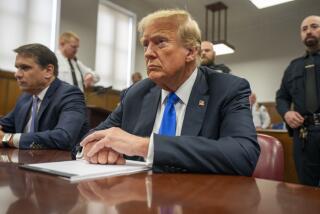At the Crossroads, It’s Decision Time for Starr
- Share via
WASHINGTON — Independent counsel Kenneth W. Starr is nearing a fateful crossroads in his investigation of President Clinton, with three paths diverging into a legal thicket.
Starr could indict former White House intern Monica S. Lewinsky and put her on trial for perjury, in hopes of forcing Clinton to testify about his own conduct. Indicting a 24-year-old would win little public sympathy for the unpopular prosecutor, but associates say Starr is unworried about his abysmal poll numbers and is bent on pursuing his case to the end.
Alternatively, Starr could strike an immunity deal with Lewinsky that would compel her to testify before his grand jury, avoiding a lengthy trial but potentially losing a chance to make a case against Clinton on obstruction of justice.
Or, in a scenario increasingly urged by some prominent lawyers, Starr could choose a quicker third route: He could simply summon Lewinsky before the grand jury to testify without a deal to grant her immunity.
Starr’s decision, which could come within weeks, will have a major effect on the course of his investigation into charges that Clinton had an illicit sexual relationship with Lewinsky, that both of them lied about it under oath and that both of them sought to prevent other witnesses from telling the truth.
The independent counsel’s choice could determine whether his probe into the Lewinsky affair can be wrapped up in a matter of a few weeks, or--if he heads for an all-out criminal trial--whether it drags out for a year or more.
More substantively, Starr’s choice of strategies could even determine whether Clinton will face an impeachment inquiry in the House of Representatives in his last years in office.
“We realize the need to get this done as quickly as possible,” said Starr’s spokesman, Charles G. Bakaly III, who carefully refused to comment about the substance of the inquest or the timing of any decision.
“We have taken the brunt of complaints that this is taking a long time, but that’s a hit we have to be prepared to take to fulfill our oath to carry out the laws,” he said.
*
During the last three weeks, Starr has called a series of key witnesses before his grand jury in what appeared to be--at least to some lawyers--the final steps before seeking formal testimony from Lewinsky.
Those witnesses included Linda Tripp, the former Lewinsky colleague who secretly taped the ex-intern’s purported confessions of a liaison with the president. Tripp spent four days before the grand jury, answering dozens of questions and emerging each day to declare that she had thoroughly enjoyed the exercise; her attorneys said she will return for more this week.
Among Washington’s clubby fraternity of upscale criminal lawyers, the betting is that Starr soon will turn to Lewinsky.
Here’s how the independent counsel’s three basic options look:
*
* Starr could indict Lewinsky and head for a trial.
He could try to charge Lewinsky with perjury (for denying she had an affair with Clinton in an affidavit for the civil suit of Paula Corbin Jones, the former Arkansas government clerk who accused Clinton of a sexual advance) and obstruction of justice (for allegedly urging Tripp to lie in the Jones case about a purported Oval Office encounter between Clinton and former volunteer Kathleen E. Willey).
Indicting Lewinsky would enable Starr to subpoena Clinton as a witness, and thus compel the president to testify about his dealings with her, some lawyers say.
But there are potential hitches in this scenario. For one thing, a trial would require several months to get underway. For another, Clinton could resist a subpoena. Lawyers are divided on the issue, but former White House counsel Jack Quinn has argued that a president can simply refuse to testify.
Finally, Starr might find it difficult to persuade a jury to convict a young woman simply for lying about an affair between two consenting adults. “He’d have an uphill battle,” one lawyer said.
*
* Starr could make a deal with Lewinsky to get her testimony against Clinton in exchange for a grant of immunity.
This was Starr’s inclination in January, when Tripp told his investigators about her tape recordings. But negotiations between Starr aides and Lewinsky deadlocked because of her insistence that she would not testify about any alleged conspiracy to obstruct justice--although she was apparently willing to confess to the lesser charge of lying about her relationship with Clinton. Lewinsky has replaced her Los Angeles attorney, William H. Ginsburg, with old Washington hands Plato Cacheris and Jacob Stein, but her new lawyers haven’t softened her position.
Bakaly has said the independent counsel won’t agree to any deal that fences off part of the charges against Clinton.
But Bakaly also said Starr normally gives a potential witness “a last clear chance” to make a deal--so this avenue remains available to both sides.
*
* Starr could call Lewinsky before the grand jury without a deal for immunity and simply order her to testify.
Under this scenario, Starr could summon Lewinsky and ask her to testify. If she refused to speak on the basis of her 5th Amendment right to avoid self-incrimination, Starr could grant her immunity from any prosecution stemming from her testimony. She would still be vulnerable to prosecution on any charges Starr has already investigated, so long as the prosecutor places the evidence under seal before she speaks.
“Calling a reluctant witness like Lewinsky and immunizing her if she declines to answer your questions is an absolutely basic thing for a prosecutor to do,” said Richard Ben-Veniste, who served on the staff of Watergate special prosecutor Archibald Cox. “Starr should have done that months ago.”
This course has two potential advantages for Starr, lawyers said: It’s fast, and it keeps some pressure on Lewinsky to tell the truth. “If she incriminates the president, he [Starr] can use it in a report to Congress,” one lawyer said. “If she doesn’t incriminate the president, and Starr can prove she’s lying, then he can indict her for perjury before the grand jury.” Most juries would view that kind of perjury as more serious than the earlier charge of lying in the Jones lawsuit, he added.
But former independent counsel Joseph E. diGenova warned that this course has pitfalls. “If she’s not going to tell the truth . . . he is certainly not going to grant her immunity,” diGenova said of Starr. “It would damage any case against her, and all you’d have is a perjury count. It isn’t worth it.”
*
For the White House, as for Starr, the distinction between confessing to a sexual relationship and the more serious criminal charge of obstruction of justice is the key issue.
“I assume she’s going to testify before a grand jury one way or another,” one close Clinton associate said. “The most important question is: What does she testify to? If she testifies to some kind of sexual relationship, the public doesn’t want to know anything more about that. If she testifies to some kind of obstruction of justice, then we have to reconnoiter.”
Two outside events could affect the timetable of Starr’s actions. A U.S. court of appeals is expected to deliver a decision soon on a claim by White House deputy counsel Bruce R. Lindsey that he can refuse to testify about potential obstruction of justice because his dealings with Clinton are protected by attorney-client privilege. If the court gives a green light, Starr may want Lindsey’s testimony before Lewinsky’s.
And the Clinton administration is considering whether to appeal to the Supreme Court an appellate court decision that the president’s Secret Service bodyguards can be ordered to testify about what they see and hear inside the White House. If the administration doesn’t appeal, Starr might want to spend some time questioning Secret Service agents before moving on.
On Capitol Hill, members of the House Judiciary Committee are still preparing for the prospect of a report from Starr detailing evidence that might amount to a bill of impeachment.
A few weeks ago, Rep. Henry J. Hyde (R-Ill.), the panel’s chairman, told members to stay within 48 hours of the Capitol. “Remember your summer may not be your own,” he warned, according to one official.
But members said they are learning to live with the uncertainty.
“I’m not nervous about it,” said Rep. James E. Rogan (R-Glendale). “I’ve been hearing since April that it was imminent. First I heard it might come in April, then May 15, then June. So I’ve become somewhat impervious to all the predictions.”
*
Times staff writers Janet Hook, Marc Lacey and David Willman also contributed to this story.
More to Read
Sign up for Essential California
The most important California stories and recommendations in your inbox every morning.
You may occasionally receive promotional content from the Los Angeles Times.














